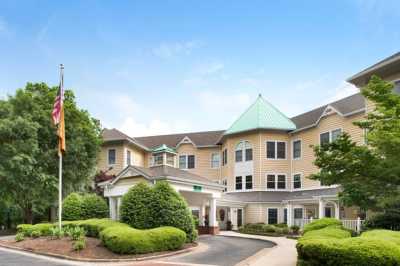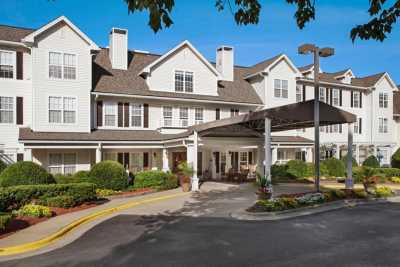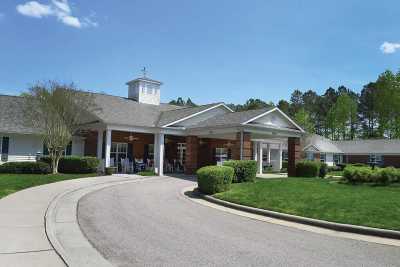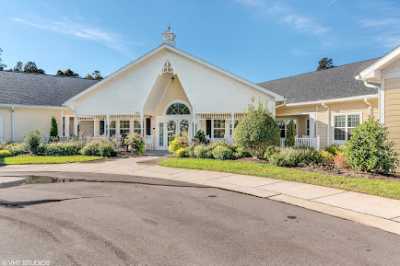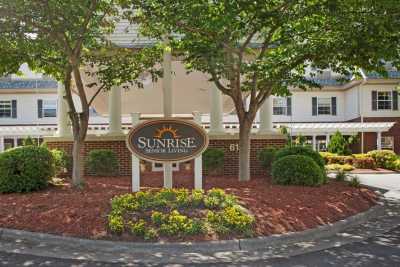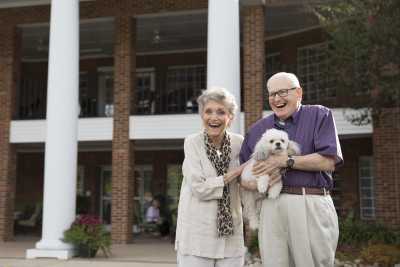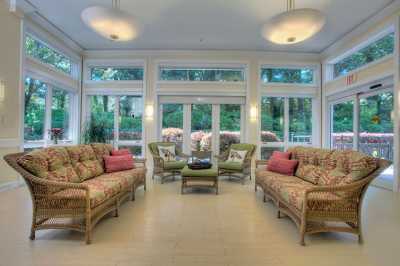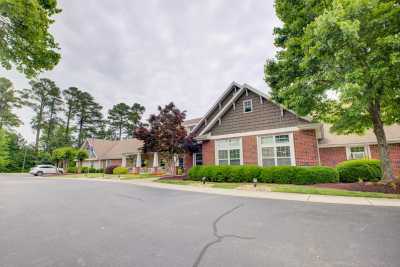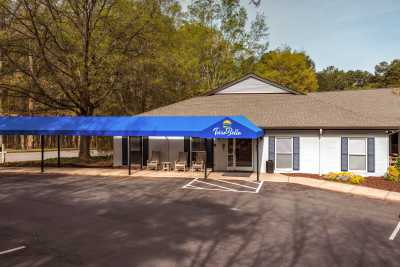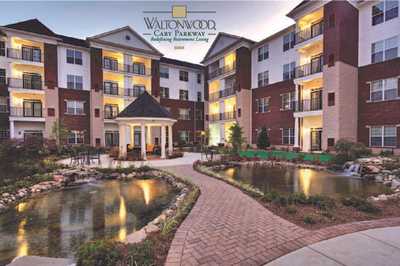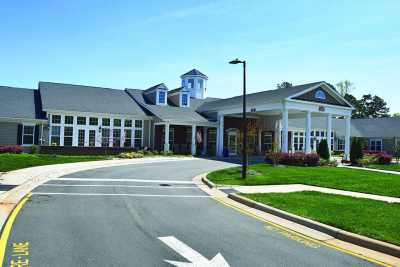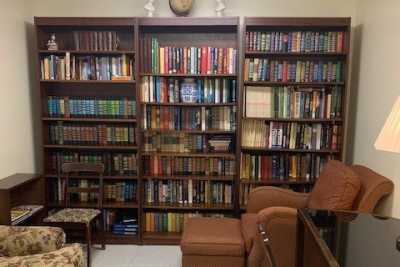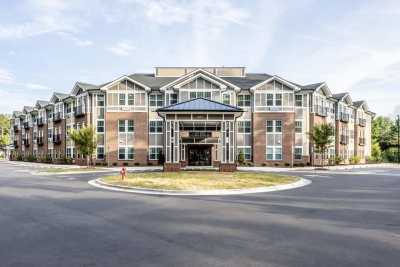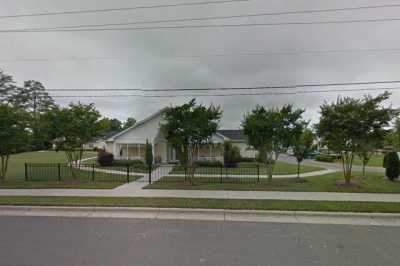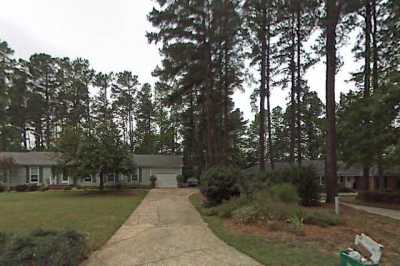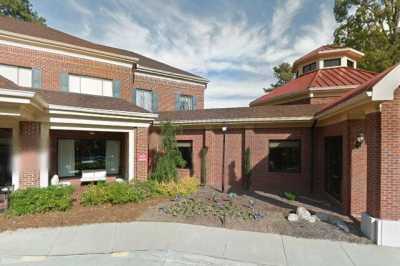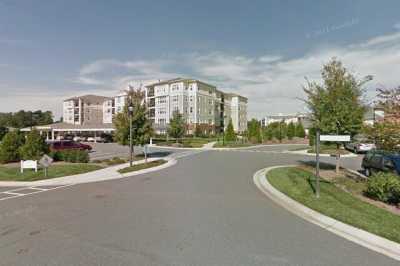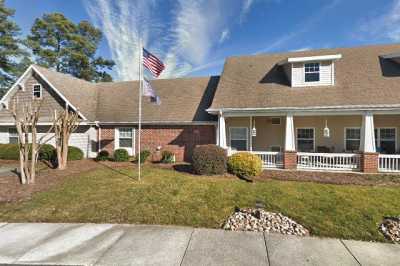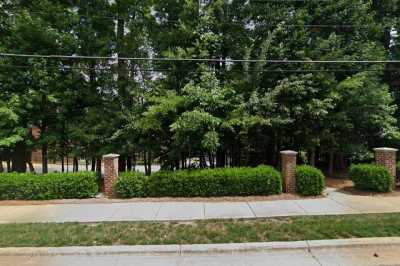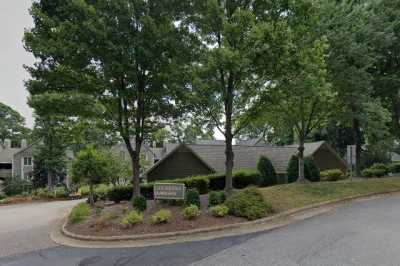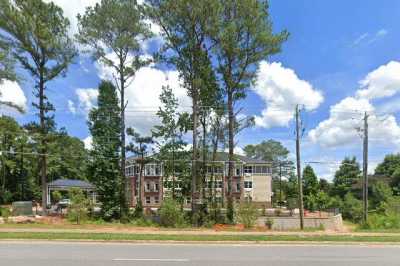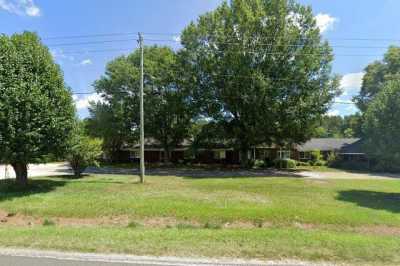
Raleigh, North Carolina, is one of the best places for seniors seeking assisted living in the United States. A booming tech economy and a reputation for affordability are the primary drivers of Raleigh’s rise. As the capital of North Carolina, Raleigh has a population of 478,587, and 12% of people are over the age of 65. Raleigh’s population has increased by 2.4% since 2022, which makes it one of the fastest growing metro areas in the United States.
Seniors in assisted living facilities find little to complain about in Raleigh. Instead, they enjoy the temperate climate, family-friendly environment, and exceptional health care options. Assisted living facilities offer seniors a safe and peaceful environment. Raleigh’s assisted living facilities provide meals, housekeeping, and help with daily activities to promote an independent lifestyle.
In this guide, we offer you a list of assisted living facilities in Raleigh that partner with A Place for Mom. We also provide well-researched and vetted information about assisted living costs, payment methods, North Carolina assisted living laws and regulations, and senior-friendly health care, transportation, and activities.
How do we rank Raleigh assisted living?
Our goal is to help you find high-quality assisted living facilities that fit your needs. Using our 20+ years of experience in senior living, we developed a proprietary rating system based on the following:
- Recent, high-quality reviews. We take into account reviews from the past two years. Then, we look for the assisted living communities people prefer. Communities that have mostly positive ratings in the past two years are prioritized over facilities that have low or no reviews in the past two years. Reviews also help us understand what matters most to families like yours and how you rate communities based on subcategories like meals and dining, staff, and cleanliness.
- Facility transparency. Communities that have robust information are prioritized over facilities that don’t offer the same level of transparency.
- Location. Assisted living facility options vary based on proximity to your desired location.
Find Assisted Living Communities Near Raleigh, NC
Raleigh, North Carolina, is one of the best places for seniors seeking assisted living in the United States. A booming tech economy and a reputation for affordability are the primary drivers of Raleigh’s rise. As the capital of North Carolina, Raleigh has a population of 478,587, and 12% of people are over the age of 65. Raleigh’s population has increased by 2.4% since 2022, which makes it one of the fastest growing metro areas in the United States.Read more
Seniors in assisted living facilities find little to complain about in Raleigh. Instead, they enjoy the temperate climate, family-friendly environment, and exceptional health care options. Assisted living facilities offer seniors a safe and peaceful environment. Raleigh’s assisted living facilities provide meals, housekeeping, and help with daily activities to promote an independent lifestyle.
In this guide, we offer you a list of assisted living facilities in Raleigh that partner with A Place for Mom. We also provide well-researched and vetted information about assisted living costs, payment methods, North Carolina assisted living laws and regulations, and senior-friendly health care, transportation, and activities.
How do we rank Raleigh assisted living?
Our goal is to help you find high-quality assisted living facilities that fit your needs. Using our 20+ years of experience in senior living, we developed a proprietary rating system based on the following:
- Recent, high-quality reviews. We take into account reviews from the past two years. Then, we look for the assisted living communities people prefer. Communities that have mostly positive ratings in the past two years are prioritized over facilities that have low or no reviews in the past two years. Reviews also help us understand what matters most to families like yours and how you rate communities based on subcategories like meals and dining, staff, and cleanliness.
- Facility transparency. Communities that have robust information are prioritized over facilities that don’t offer the same level of transparency.
- Location. Assisted living facility options vary based on proximity to your desired location.
Raleigh Assisted Living Facilities | 470 Reviews
The staff is very friendly and accommodating. ALWAYS visible doing their jobs. I've had the food on two occasions and I recognize that it is prepared for the residents and not the outsiders. I'm sure it's...
The staff at Brighton Gardens are remarkably caring both in assisted living and in memory care. Staffing is much more stable than at any other senior residence in the area based on the other facilities I’m...
My loved one was a resident at Spring Arbor of Raleigh until they had a fire recently, which unfortunately displaced most of the residents. The staff at this facility was great. My loved one really liked the...

it's been good, very positive. laundry services a bit mixed up but very caring staff. We picked this community because it felt more welcoming.
We have been visiting a family friend who lives at this community for about 2 years now and every time we come it is always so nice. The staff are so friendly and helpful, the activities are always so...
From the moment you walk into Abbotswood at Stonehenge you will realize what a special place it is. Spend some time and you will confirm your initial feelings. You will see smiling faces and happy residents....
So far everything has gone well. My mom has been there 7 weeks and seems to be adjusting better than at first. Everyone has been very friendly and the location is great!
Communicating between staff and shifts could be a little better. Yes we would recommend this community to other families, but they have let go of two Director level staff and we are waiting to see if new...
My dad connects with the staff and they care for him and care about him as a friend. Laundry needs work give it a 3, but everything else has been great. I'm happy with his overall care and he is, too. Dad's...
Waltonwood - Cary has been very easy to work with - sensitive to all of our needs and individual situation. My parents love the food, the socialization, the activities and the grounds, apartments and...
Our free advisors can help
- Compare local facilities
- Determine care type
- Schedule tours
- Evaluate pricing
The activity director works hard to include residents in activities. My mother in law does not ask for help and does not recognize her limitations. She is reluctant to engage in activities and has not...
This community came highly recommend to us, and we can't say anything other then we are completely impressed. When we first walk through the door someone is always there to greet us, and there is no stich...
We chose Foundation Senior Living because my mother wanted to stay in the area. It is also a new facility and we figured she would get more attention with the lower amount of residents here. The staff are...
I have found The Addison to be a good place for my mother. It is not perfect, but I do feel confident she is well taken care of. They are responsive to her needs and the staff maintains a positive attitude.
- Costs of assisted living in the Raleigh area
- How people pay for assisted living in Raleigh
- Understand North Carolina laws and regulations for assisted living facilities
- Get to know assisted living in Raleigh
- What to expect from assisted living in Raleigh
- Explore senior care with confidence
- Unfamiliar with Raleigh? Highlights for seniors
Costs of assisted living in the Raleigh area
The average cost of assisted living in Raleigh is $6,303 a month. This amount includes basic fees on top of baseline costs. Seniors and their families paid $6,303 a month on average for their assisted living facilities in Raleigh, according to A Place for Mom’s proprietary data.[03] This monthly cost typically covers the following:
- Rent and utilities for an apartment or room
- Daily meals, including snacks
- Personal care services, such as assistance with grooming and mobility
- Housekeeping and laundry services
- Access to on-site amenities, such as a gym or pool
- Activities and classes, such as social hours and fitness classes
Some services may require an extra fee. Some of the most common include the following:
- Room service or special diet meals
- Pet fees
- Barbershop, salon, or spa services
- Certain outings, such as a visit to a museum with an entrance fee
Cost of living in Raleigh
Raleigh’s overall cost of living is 3% lower than the national average, but 2% higher than the average in North Carolina. As the epicenter of the Research Triangle, Raleigh’s technology economy is booming, and has driven housing costs up around 1.8% since 2022.[04]
Seniors choosing an assisted living facility in Raleigh will pay more than seniors in other North Carolina cities, with the exception of Asheville. However, the benefit of living near world-class health care facilities in a city that offers such a high quality of life outweighs the additional cost for many seniors.
North Carolina is somewhat tax-friendly for seniors. Unlike many other states, it doesn’t tax retirement benefits from Social Security. However, other forms of income are taxed at a flat rate of 4.75% as of 2023.[05]
Cost of assisted living in nearby areas
The chart below compares the cost of assisted living in Raleigh with nearby cities. The numbers reflect the average baseline costs before other fees are added.
Average cost comparisons near Raleigh, NC
Average monthly costs
Raleigh, NC
How people pay for assisted living in Raleigh
Most seniors and family members pay for assisted living with a combination of private income and public assistance. Due to the increasing costs of assisted living, there can be many options to help pay for senior living expenses with public assistance programs, such as veterans benefits, Medicaid, and Medicare.
Read on to find practical information about how to pay for assisted living costs using private funds and public means.
Seniors and their families typically pay for most of their assisted living costs using private funds. Private payment methods include a senior’s savings and all other financial assets, such as real estate, general investments, retirement pensions, and Social Security benefits. It’s a good idea to review your or your loved one’s total financial situation before deciding on an assisted living facility.
You can learn more about specific private payment methods in the articles below:
Number of veterans over 65+ who live in Raleigh
About 40% of Raleigh veterans are 65+
Veterans and their families may be eligible for veterans benefits to pay for some of their assisted living expenses in Raleigh. Veterans benefits won’t cover the entire cost of assisted living, but may cover certain expenses. The Aid and Attendance benefit is one of the most generous veterans benefits. It’s added to an existing VA Pension, and covers anything that improves the veteran’s quality of life, including expenses related to assisted living.
There are many different veterans benefits, each with their own eligibility requirements. If you think you or your loved one may be eligible for veterans benefits, consider reaching out to a veterans benefits counselor. You can find excellent veterans benefits counselors through VA-vetted nonprofit veterans services organizations (VSOs). Some counselors may also help appeal denied claims.
Veterans in Raleigh can reach out to the following organizations for veterans benefits counseling:
- North Carolina Department of Military and Veterans Affairs. This state department offers benefits counseling to all veterans and their loved ones residing in the state. All counseling services come at no cost to veterans or their families. The department has local offices in every county in North Carolina, and you can sign up for benefits counseling through their website.
- Disabled American Veterans (DAV). This nonprofit organization is not affiliated with the VA, but offers compassionate, high-quality benefits counseling through their local offices. The DAV caters to American veterans with disabilities.
- Veterans of Foreign Wars (VFW). This organization is a nonprofit that offers support to local veterans, including benefits counseling. It’s not affiliated with the VA, but counselors still offer useful information regarding veterans benefits applications. Contact the post closest to you to get connected.
Resources for Raleigh veterans
North Carolina Department of Military and Veterans Affairs
413 North Salisbury St.
Raleigh, NC 27603
Phone: 844-624-8387
Wake County Region 1 Veteran Service Office
4401 Bland Road
Raleigh, NC 27609
Phone: 919-212-8387
Disabled American Veterans (DAV) North Carolina
5623 Duraleigh Road,
Raleigh, NC 27612-2700
Phone: 919-833-5567
Veterans of Foreign Wars North Carolina
917 New Bern Avenue
Raleigh, NC 27601
Phone: 919-828-5058
Find a post
Medicaid is a state-run health insurance program for low-income individuals and people with disabilities. Each state runs their Medicaid program differently. North Carolina Medicaid is run through the Division of Health Service Regulations. Medicaid won’t cover the cost of assisted living facilities in Raleigh. However, Medicaid can offset specific health care costs for seniors in assisted living.
What does North Carolina Medicaid cover?
North Carolina Medicaid functions like most health insurance programs and covers health care costs only. The following health care services are often covered in part or in total by North Carolina Medicaid:
- Preventative care, including vaccines and physicals
- Outpatient physical and rehabilitative therapy
- Home health care services
- Prescription medications
- Medical equipment
- Laboratory testing
- Vision, dentistry, and podiatry care
- Inpatient hospital care
Using special assistance programs to cover assisted living costs in Raleigh
While North Carolina Medicaid doesn’t cover assisted living costs, the state does offer special programs to help seniors in need afford assisted living care. Low-income seniors may be eligible for the Special Assistance (SA) program. The SA program pays up to $1,182 a month for a senior’s assisted living facility. Low-income individuals residing in Raleigh’s memory care facilities receive up to $1,515 a month.
Eligibility for North Carolina Medicaid
Low-income North Carolina residents in need of health care or insurance assistance are eligible for North Carolina Medicaid. Income limits are updated annually. In 2023, the income limit for North Carolina Medicaid eligibility was $19,392 a month for a single person. To qualify for Medicaid, you must meet one of the following requirements:
- Be 65 years of age or older
- Be blind
- Have a disability
- Be responsible for a person age 18 or younger
- Be pregnant
Find help applying for North Carolina Medicaid
Applying for Medicaid benefits can be a confusing process. We recommend reaching out to North Carolina’s Medicaid Contact Center for questions regarding your eligibility or coverage. You can also contact the Wake County Medicaid Department for Medicaid application assistance. Your complaints or concerns can also be sent to the long-term care ombudsman.
Raleigh resident Medicaid resources
North Carolina Medicaid Contact Center
2501 Mail Service Center
Raleigh, NC 27699
Phone: 888-245-0179
Email: Medicaid.Transformation@dhhs.nc.gov
Medicare is a federal health insurance program for individuals 65 years of age or older who have paid their Medicare taxes. While Medicare doesn’t cover room or board at an assisted living facility, it can cover specific health care expenses for those residing in a Raleigh assisted living facility. Similar to other health insurance programs, Medicare recipients are expected to pay for a portion of their care through premiums.
What does Medicare cover?
In general, Medicare covers short-term and medically-necessary health care expenses. Before Medicare provides coverage, both a physician and a Medicare representative must reach a consensus on the medical necessity and short-term nature of the procedure, item, or test. Keep in mind that what’s considered medically necessary for one person may not be for another. A few examples of what Medicare often covers includes the following:
- Emergency in-patient care, such as an appendectomy
- A walker or wheelchair
- A short-term stay at a rehabilitation facility after a medically-necessary procedure
Medicare doesn’t typically cover services like the following:
- Meals or rent at an assisted living facility
- Nonmedical care, such as personal care
- Long-term or indefinite stays at a facility
North Carolina Medicare savings programs
If you or your loved one is having trouble paying for Medicare premiums, North Carolina offers a few Medicare savings programs to help offset costs:
- The Extra Help program. This program helps people with limited income pay for Medicare prescription drug costs.
- The Qualified Medicare Beneficiary (QMB) program. This program helps pay for Part A and B premiums, which include outpatient care, preventative care, and regular doctor’s visits.
- The Qualified Individual (QI) program. This program helps pay part of Part B premiums only. This program has income limits which are updated regularly. For 2023, the income limit is $1,426 a month for an individual.
- The Specified Low-Income Medicare Beneficiary (SLMB) program. This program can help pay for some Part B premiums.
- The Qualified Disabled and Working Individuals (QDWI) program. This program is for seniors with disabilities who are still working. It helps cover some of Part A premiums.
Medicare benefits counseling
Seniors and their loved ones often find themselves applying for Medicaid coverage in the midst of a medical emergency. If this is you, consider speaking with a Medicare benefits counselor to help you make sure you get the coverage you need. There are a few options available to Raleigh seniors, including the following:
- Medicare and Seniors’ Health Insurance Information Program (SHIIP). This program employs Medicare benefits counselors who help with eligibility and application questions. You can call them directly at 855-408-1212 from Monday through Friday during normal business hours, or email questions to ncdoi.ncshiip@ncdoi.gov.
- North Carolina Long-Term Care Ombudsman. You can direct all complaints about your Medicare coverage to the long-term care ombudsman, who can help resolve them.
- Long-term care attorneys. If your situation is unique or you’re having trouble applying, consider reaching out to a long-term care attorney for personalized assistance.
Raleigh resident Medicare resources
Find a Social Security Office
3315 Poole Road, Suite 100
Raleigh, NC 27610
Phone: 800-772-1213
Understand North Carolina laws and regulations for assisted living facilities
Assisted living facilities in Raleigh provide a safe environment and high-quality care. All assisted living facilities in North Carolina are licensed as Assisted Living Residences through the North Carolina Department of Health and Human Services, Division of Health Service Regulation. Residential care homes and larger, traditional assisted living facilities receive the same license. Assisted living facilities aren’t licensed by the federal government.
Inspection reports
The North Carolina state government outlines requirements for assisted living facilities. Facilities that don’t meet these standards during annual inspections are listed on the North Carolina Listings of Facilities with Penalties website, and can lose their license. You can find all inspection results by visiting the North Carolina Adult Care Licensure Section. It’s a good idea to read the most recent inspection reports for any assisted living facility you’re considering.
Requirements for North Carolina assisted living facilities
You can find all assisted living requirements for North Carolina’s assisted living facilities through the Rules and Statutes for Adult Care Homes and the North Carolina Compendium of Residential Care and Assisted Living Regulations and Policy. All assisted living facilities in North Carolina are required to meet the following criteria:
- Meet all safety and building codes
- Respect the residents’ dignity and autonomy
- Allow residents to make their own health care decisions
- Allow residents and family members to make complaints without retaliation
- Provide at least 80 hours of personal care training to caregiving staff
- Provide care plans for each residents, including an initial assessment with annual updates
- Update residents and family members of any changes to fees or care
- Not accept residents who need skilled nursing care
North Carolina Department of Health contact information
North Carolina Department of Health
101 Blair Dr.
Raleigh, NC 27603
Phone: 919-855-4800
COVID-19 regulations for Raleigh assisted living facilities
Raleigh doesn’t enforce any COVID-19 regulations for assisted living facilities, and neither does North Carolina. However, the North Carolina Department of Health does offer some guidance and training resources for long-term care facilities about how to stop the spread of COVID-19. All assisted living facilities in North Carolina follow CDC guidance.
The North Carolina Department of Health and Human Services track all respiratory diseases on the Respiratory Virus Summary Dashboard. This can help you find where flu, RSV, and other respiratory diseases are spreading.
Get to know assisted living in Raleigh
6,352
Number of people we referred to assisted living facilities in Raleigh in 2022 – 2023
82
Average age of residents we referred to assisted living facilities in Raleigh
44% of Raleigh assisted living communities are residential care homes.
What to expect from assisted living in Raleigh
Raleigh, North Carolina, is one of the best places to retire in the United States. While most seniors looking for assisted living in Raleigh are either from the area or moving to be near their families, some choose to move to Raleigh to enjoy the temperate climate, low cost of living, and exceptional health care facilities.
Assisted living facilities in Raleigh offer compassionate and personalized care to seniors who need extra, nonmedical help with their daily activities. Seniors with dementia or indefinite skilled nursing care needs may be better suited for Raleigh’s memory care facilities or nursing homes.
Types of assisted living facilities in Raleigh
A Place for Mom partners with 25 assisted living facilities in North Carolina.[03] While all of these facilities receive the same license, there is some variety in the types of communities seniors can choose from.
Residential care homes
In Raleigh, about 44% of assisted living facilities are residential care homes.[03] These smaller communities have less than seven residents and are set within residential homes. In general, these tend to be less expensive than other assisted living facilities, and offer fewer amenities as a result. However, they are a good fit for seniors who prefer a homelike environment instead of a larger, more institutional setting.
In a residential care home, seniors typically share a room with another resident, spend their time in the home’s common areas, and eat meals in the family dining room. Caregivers often live in the facility with the residents. Many seniors enjoy the camaraderie that develops in these residential care facilities. There is no difference between residential care homes and traditional assisted living facilities regarding the types of care they provide or the quality of care. In fact, both residential care homes and traditional assisted living facilities are licensed in the same way through the North Carolina Department of Health and Human Services.
Traditional assisted living facilities
The majority of assisted living facilities in Raleigh have between 15 and 50 residents. These facilities are set in larger buildings, and may be large enough to accommodate multiple buildings on a campus. In these communities, residents can choose between private and shared rooms. There are different common areas to enjoy, such as libraries, pools, gyms, spas, bars, game rooms, theaters, and outdoor areas, like gardens and walking trails.
Traditional assisted living facilities in Raleigh often employ an activity’s coordinator who arranges daily classes, events, and outings for the residents. Among the larger assisted living facilities, approximately half provide at least one additional type of care. Typically, these establishments feature dedicated memory care wings for residents with dementia. These larger facilities tend to be more expensive than residential care homes.
Living in Raleigh as a senior
Raleigh is growing quickly — a result of the booming technology industry and the Research Triangle. Seniors in Raleigh’s assisted living facilities benefit from Raleigh’s growth. The overall wealth and safety in the city means seniors have no trouble finding parks, events, and educational opportunities. Plus, family members may be eager to move to Raleigh if their loved one is a local resident.
Explore senior care with confidence
Know where to start.
Identify the right care for your loved one with our free assessment.

See what you can afford.
Understand cost and payment for long-term care based on your loved one's needs.

Find top facilities for you.
Free, personalized guidance from our Senior Living Advisors can help you narrow your search.

Tour your favorite facilities.
Our free touring checklist can help you choose the right community.
Unfamiliar with Raleigh? Highlights for seniors
58,522
Number of seniors over the age of 65 currently living in Raleigh
Percentage of seniors 65 and older within the Raleigh population
$62,125
Median annual income for Raleigh seniors 65 and older
Health care for seniors in Raleigh
Due to the proximity of Duke and North Carolina University hospitals, seniors have access to the best cutting-edge geriatric care in the nation.

Duke University Hospital
Duke University Hospital offers a full range of primary and specialty care, including geriatrics, oncology, and ophthalmology. Considered one of the best hospitals in the nation, Duke University Hospital is a teaching institution where Duke University medical students and residents receive training. The hospital is located in Durham, and patients have access to cutting-edge technology and treatments. It’s approximately thirty minutes from Raleigh’s city center, but serves the entire Raleigh-Durham area.

UNC Hospitals
The UNC Hospital System has eight different locations across North Carolina. The Raleigh location is called UNC REX Healthcare, and was named a five-star Hospital by the Centers for Medicaid and Medicare Services (CMS). It offers the full scope of primary and specialty care, including geriatrics, general surgery, and urgent care.

WakeMed Raleigh Campus
This private, nonprofit hospital system has three locations across North Carolina. The Raleigh location offers a range of primary and specialty services, including geriatrics, orthopedic surgery, and rehabilitation care. This hospital uses some of the most updated surgical and imaging technology to give patients the best care.
Transportation for seniors in Raleigh
Most seniors in Raleigh assisted living facilities don’t need to worry about finding transportation, as 56% of our partnering assisted living facilities offer it as a complimentary service.[03] Seniors can count on their facilities to help them arrange transportation to and from appointments. However, seniors may need help finding their own transportation to attend social gatherings or events outside of their community. Family and friends are usually able to take their loved one out for day trips or vacations.
The North Carolina Department of Health and Human Services offers their Transportation Services to seniors across the state. This program funds free transportation for seniors over 60 years of age. The department does this through funding local public transportation, which provides their services for free. Seniors can use these services to go to the grocery store, social events, and appointments. Seniors living in Raleigh can call 919-872-7933 to schedule a ride.
Traffic in the Raleigh-Durham area is increasingly congested, especially during rush hour. Visiting family and friends should keep this in mind as they plan visits and day trips around the area.
Senior activities in Raleigh
Raleigh is a budget-friendly city for seniors who want to experience world-class museums, relaxing outdoor activities, and quaint farmers markets. Seniors living in Raleigh’s assisted living facilities may find they’re kept busy with a variety of activities within their community. Around 92% of Raleigh’s assisted living facilities offer on-site activities, such as tai chi, happy hours, bingo games, and visiting performers. In Raleigh’s assisted living facilities, 48% also offer educational opportunities where residents can polish up their financial literacy and even learn a different language.[03]
Raleigh’s growing economy and engaged community means visitors are common, including university volunteers who want to chat with the residents or teach them a new skill.
Outdoor activities around Raleigh
With over 150 parks, Raleigh is a great place for seniors of all mobility levels to enjoy the great outdoors. Local family and visitors find no shortage of things to do year-round in Raleigh.
- Pullen Park. Set on 66 acres, Pullen Park is one of the oldest amusement parks in the nation. This is an especially popular place to bring grandchildren, as it has a carousel, pedal boats, and regular theater performances. It’s open all year and most activities and performances are free. The park outdoor spaces are open from dawn to dusk every day.
- William B. Umstead State Park. This state park is located about 10 miles northwest of Raleigh and offers hiking trails and three lakes where you can fish. There are two different entrances, but the visitor center is near the Crabtree Creek entrance. This is where you can find information about trail closures, camping, fishing licenses, and more. The park is accessible from 8 a.m. to 6 or 9 p.m., depending on the season.
- Dorothea Dix Park. The largest park in Raleigh, Dorothea Dix Park has a sprawling 308 acres in the heart of Raleigh. It offers groomed lawns, shaded tree areas with picnic spots, and a beautiful view of the downtown Raleigh skyline. It’s open all year and is free to the public.
- Mordecai Historic Park. Mordecai Historic Park is set in downtown Raleigh, and encompasses a range of historic buildings in Raleigh’s downtown neighborhoods. Included in these buildings are Andrew Johnson’s birthplace, the Plantation Office, and the famous Mordecai House. To fully enjoy this experience, you can purchase tickets for a guided tour at the Visitor’s Center. The tours begin at 10 a.m. and take place every hour until 3 p.m. Seniors have discounted tour fees at $4. Call 919-996-4364 to see if there are spots available for your preferred time.
- JC Raulston Arboretum at NC State University. This beautiful oasis is part of the North Carolina State University horticulture program. Located near the North Carolina State Fairgrounds, it includes a Japanese garden, perennial and annual flower displays, and an educational center. Admission is free but donations are accepted. Most paths are not paved, but are wheelchair-accessible.
Cultural activities around Raleigh
Raleigh’s status as the capital of North Carolina and as part of the Research Triangle means there’s no shortage of cultural activities appropriate for seniors.
- North Carolina Museum of Art. Set on a 164-acre park, the North Carolina Museum of Art has a collection that ranges from ancient history to contemporary pieces. Both the museum and the park are free to visitors, but special exhibitions often cost about $15. There is an accessible drop-off area and parking, and wheelchairs are available at no cost for visitors. The museum is open from 10 a.m. to 5 p.m. Wednesday through Sunday.
- Martin Marietta Center for the Performing Arts. Previously known as the Duke Energy Center, this performing arts center showcases the North Carolina Symphony, and dance and theater performances. All upcoming events can be found on the website. Tickets are sold through Ticketmaster, and seniors may receive a discount for individual performances. The center has accessible parking and wheelchair-accessible seating.
- Osher Lifelong Learning Institute. The Osher Lifelong Learning Institute offers academic courses for seniors over 50. Courses are not credited, but include a wide range of subjects. Seniors can learn about microbiology, ancient history, or Shakespearean drama. The institute occasionally offers field trips to local museums and historic sites. It costs $40 to participate during a semester. Most classrooms are wheelchair-accessible.
- Triangle Restaurant Week. Triangle Restaurant Week is an annual event celebrating the culinary treasures of the Raleigh-Durham area. While the dates change each year, they’re typically in the middle of June. Participating restaurants offer special menus and fixed pricing so you can try as much of the local fine dining as possible. Lunch costs about $15 and dinner costs between $25 and $50.
Frequently asked questions
Oak Hill Assisted Living, Sunrise of Cary and Gabriel Manor are the top-rated Assisted Living facilities near Raleigh, NC. These Assisted Living facilities received the highest rankings based on verified family reviews. See full list of communities.
The average cost of Assisted Living in Raleigh is 5517.63 per month. This cost may vary based on location, amenities, floorplan, level of care and other factors.
References
United States Census Bureau. (2021). Age and sex (S0101): Raleigh city [Data set]. American Community Survey.
Macrotrends.net. (2023). Raleigh Metro Area Population 1950-2023.
A Place for Mom. (2022). A Place for Mom proprietary data.
Rentcafe.com. (2022). Raleigh, NC rental market trends.
North Carolina Department of Revenue. (2023). Tax Rate Schedules.
United States Census Bureau. (2021). Veteran status (S2101): Raleigh city [Data set]. American Community Survey.
United States Census Bureau. (2023). Mean income in the past 12 months (S1902): Raleigh city [Data set]. American Community Survey.

More questions?
Ask an A Place for Mom local advisor at no cost.
- Durham, North Carolina
- Cary, North Carolina
- Apex, North Carolina
- Chapel Hill, North Carolina
- Holly Springs, North Carolina
- Wake Forest, North Carolina
- Clayton, North Carolina
- Six Forks Crossroads, North Carolina
- Wendell, North Carolina
- Zebulon, North Carolina
- Creedmoor, North Carolina
- Garner, North Carolina
- Butner, North Carolina
- Knightdale, North Carolina
- Franklinton, North Carolina
- Youngsville, North Carolina
- Glenwood Village, North Carolina
- Bethesda, North Carolina
- Merry Oaks, North Carolina
- Green Acres, North Carolina

